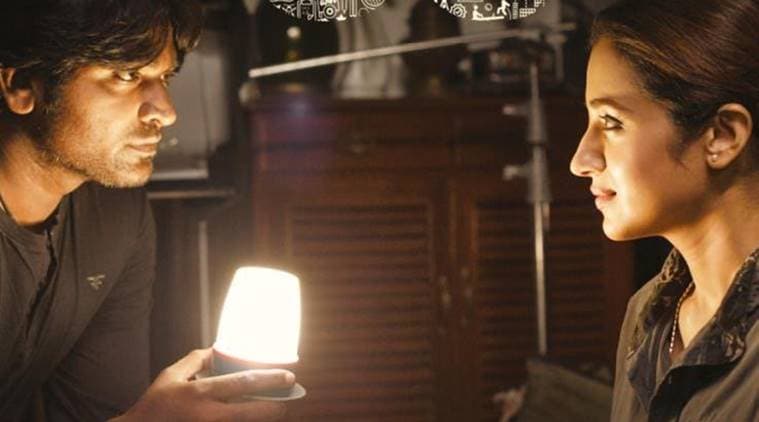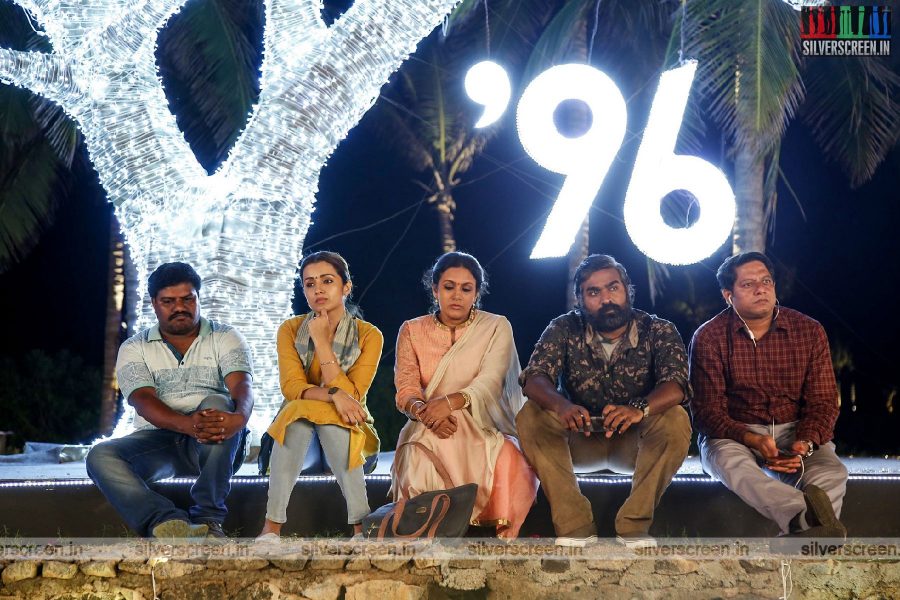Certain books and films make you feel very strongly for several days at a stretch. While you mull over them, a lot of thoughts keep popping up. You can't rest until you have sorted all those thoughts neatly and put them down. I have never written any review two parts, But there is a lot to say, about '96. Putting them all together would not only make it a bunch of disjointed thoughts but also a long boring read. So, I have split my observations about the film into two parts. 'Facts' and 'Feelings'. 'Facts' is about the technical aspects, who did what, how I liked it and so on. 'Feelings' is about well, just my feelings. Here are my 'Feelings'.
****
*Spoliers galore*
Feelings:

Ram, a travel photographer believes that the only place where one can freeze time is in a photograph. That's how he lives too. In an island of memories. But he is no Devdas. He just goes about doing the thing he loves to do. Freezing moments. He is happy to visit his hometown but does not want to stop by. He might have to make small talk with people there, you see. His eyes sparkle when he spots his school. He impulsively stops by and doesn't even mind catching up with the school watchman (played by a darling Janakaraj). In the beginning, Ram is all sprightly, exploring every corner of the school with excitement. I squealed in delight when he brushes off the chalk-dust from the frame of a blackboard with a finger. Oh? So it wasn't just me who loved to do that! Watch the way he drags the desk closer to him when he sits on the first bench in the classroom. But he becomes broody and nostalgic by the end of the visit and this culminates in a longing for a reunion. Old friends meet. Old flames get reignited, not with the intensity of a fire but with the gentleness of moonlight. Quite naturally now, the friends get worried. It is the same gang that prodded the shy Ram in school (quite naturally for that time).
Ram and Janu take off from the word 'go' as if the past 22 years were just a fluid dream. As awkward as they were in Class 10, yet, as much in love, or even more, perhaps. The heart has this capacity to nurture some memories with each pump. The memories then grow and grow to become larger than the actual events. Memories are like an arm that grows with you. Mind you, this is different from what sceptics brush off as 'illusion'. Forget lovers. Take childhood friends, for instance. There might not be a thing common between the two of them anymore but they are still friends. That's because they are still the same people after all. Like I have always believed, where ever life takes you, the core of the person will never change. It is only the circumstances that make you react differently.
So Ram has now grown to be a bearded hulk, but he is still shy or shall I say 'faint-hearted'? (Miss the movie, you miss the pun.). He generally speaks very little but becomes a motormouth when he is excited about something. It is Ram, the more sentimental of the two, who lightens the atmosphere every time there is a tricky moment. There is still a world of innocence in his thoughts and actions, with or without the beard. And Vijay Sethupathi shows it so beautifully.
Janu is still the bolder and the more outspoken one of the two. Makes Ramu (and even me) jump out of the seat when she offers her plate to him. She sometimes pretends to have moved on. She tries to put on a 'chilled out' facade. She asks Ram blatantly personal questions which Ram finds too personal even for a lover to ask. She bawls like a baby when she knows the truth about the things he did. But soon collects herself. When he asks her if she is happy, she says life is peaceful. Now does that answer the question? We don't know.
In fits and starts, Ram and Janu speak about the lost moments. Dream up the what-ifs. Someone said they don't ask each other much about their present. I say, they won't. They don't want to know. "Here I am, unwilling to fill the space that has a beautiful memory. Why would I want to know about your daily routine with your child and husband?" No thanks, too painful.
As the evening progresses, they get completely comfortable with each other. He loosens up. You know it from his voice. You feel the love in every little action - every flick of the eye, every little smile, every question and every answer. She breaks her twenty-year-old resolve and sings Yamunai Aatriley (a non-S Janaki song). This simple little action perhaps shows a huge change within. "Maatrangal Vidai, Maatrangeley Vinaa." (That's, by the way, one of the most impressive opening lines I've seen in a film recently. Listen to the poem recited by Nasser, it's beautiful).
Janu worries about Ram's loneliness. Her repeated talk of his marriage seemed a little annoying and made me wonder if she is trying to fix her own guilt. But I soon understood that it was out of genuine concern. When you can't take away your only possession, you want to at least place it in safe hands. Like Ram's student says, he needs to be taken good care of. But how the hell is she supposed to do it? That angst is so well brought out in the final airport scene. And the way she holds his face at that point...is that her closure? Oh the pain!
There is constant movement throughout the film (they are in a car, on a train, they walk) hinting at momentum, but when it is time to fly, his condition remains status quo, in spite of holding a valid ticket. There is a pain of losing yet there is a comfort of gaining something they never had. Janu's life might or might not be the same again. But for Ram, things are not going to change much. Only, he now has another piece of memory to stow away in the safety of his moulded-plastic suitcase with a secret number lock.
***
You can read Facts here.
(Pic courtesy: The Indian Express; Silverscreen.in)







